Урок з англійської мови "Різні види спорту"
Form: 6
Theme: The Different Kinds of Sport
Lesson’s type: systematization pupils’ knowledge
The aims of the lesson:
‒ Practical: to improve reading skills; to intensify lexical material.
‒ Educational: to improve pupils’ knowledge about the Present Perfect Tense.
‒ Developing: to develop students’ memorization, concentration and logical thinking.
‒ Cultural: to bring up the positive attitude to the learning of English.
Equipment: a text-book “We Learn English” by Alla Nesvit, presentation, blackboard, cards.
Procedure of the Lesson
- Organization moment
T.: Good morning, pupils! How are you?
Ps.: Good morning, teacher. Thank you! Fine!
T.: Good! What should you do to be healthy?
P. 1:We should do exercises every day.
P. 2: We should eat healthy food.
P.3:We should clean our teeth twice a day.
P. 4:We should go in for sports.
T.: Yes, right you are. Today we’ll know about the most popular sports in Great Britain. But, firstly, let’s check your home-task ( a card, ex. 7, p. 86).
II. Warm – up
T.: How many names of sports can you think of in Great Britain? Write down as many as you can.
Sport
Football, cricket and tennis, darts, football, horseracing and rugby.
T.: Good job! Answer the questions.
1. What is an individual sport?
2. What is a team sport?
3. Do you know the names of any famous British sportsmen or women?
- The main body
T.: Ok. Now let’s read and translate the text.
Sport in Britain
Sport in Great Britain. The British are regarded to be stolid and phlegmatic. True or not, their traditional sports are rather slow and effortless. A good example of such a sport is darts a popular game played in pubs in which short steel darts are thrown at a circular board with the aim of scoring a particular number of points.
As darts is popular among the working class, golf is played by the upper classes. This is an old Scottish game for two or four persons who hit small hard balls with special golf-clubs into 9 or 18 holes on a mown ground called a golf-course.
Cricket is even more sophisticated. The cricketers are usually men traditionally wearing white clothes. The game is played by two teams of 11 people on a mown grass field with special bats and wickets.
The English also like snooker (very similar to billiards) and bowls, a game in which a heavy wooden ball is rolled over a lawn in such a way that it stops as close as possible to a small white ball.
Another British sport is polo (reserved for the elite), a ball game played on horseback with mallets.
The sport mentioned above may be considered as typically British but it does not mean that they are the most popular ones. The vast majority of British people take part in individual sports such as swimming, cycling, fishing, aerobics or just walking. However, only 10% of adults practice sports regularly. Others prefer watching sports on TV. The favourite spectator sports are football (the national game), rugby, athletics and tennis.
After-Reading
T.: Find 4 examples of:
- spectator sports;
- participant sports;
T.: What are the most popular sports in Britain? Are they spectator or participant sports?
T.: Look at the pictures and answer the questions (presentation).
1. Can you name these sports?
2. Describe one of these pictures.
3. Are any sports popular in our country? Which one(s)?
The Present Perfect Tense означає дію, яка завершилася до поточного моменту або завершена в період теперішнього часу (в цьому році, на цьому тижні).
The Present Perfect вживається для опису дій, які під час мовлення вже завершені. У цьому випадку в центрі уваги перебуває саме завершена дія.
We have bought a new TV set.
Ми придбали новий телевізор (Ми маємо новий телевізор).
The students have left the room.
Студенти вийшли з кімнати (студентів зараз нема в кімнаті).
Go and wash your hands.
Піди і вимий руки.
I have washed them.
Я їх вимив (зараз руки в мене чисті).
Хоча дієслова у The Present Perfect часто перекладаються українською мовою в минулому часі, слід пам’ятати, що в англійській мові ці дії є діями теперішнього часу.
Для the Present Perfect характерні прислівники: already, still, yet, ever, just, recently, never, today, this week.
Вживання:
1. Для позначення дій, які (не) завершилися на поточний момент:
– Have you finished your job?
– Ти завершив роботу?
– Yes, I have/ No, I haven’t.
– Так/Ні.
The train has just arrived.
Потяг щойно прибув.
She hasn’t written the test yet. Вона ще не дописала контрольну
2. Для позначення дій, які відбувалися в минулому, але актуальні зараз:
-Have you passed your driving test?
– Ви вже здали іспит на право керування авто?
– We can’t enter the room.I’ve lost my key.
– Ми не можемо зайти до цієї кімнати. Я загубила ключі.
3. Для опису дій, які почалися в минулому і досі тривають:
I’ ve always liked him.
Він завжди мені подобався (в минулому і зараз).
I have known him for years / since my youth / since 1990.
Я дуже довго його знаю / з дитинства / з 1990 року.
He has written about a hundred novels.
Він написав близько 100 романів.
4. Для позначення дій, що мали місце у період часу, який ще не минув. (з виразами на кшталт “this morning” / “afternoon” / “week” – сьогодні ранком / вдень / на цьому тижні:
Has the postman come this morning?
Поштар приходив сьогодні зранку?
He hasn’t phoned this afternoon.
Він ще не телефонував сьогодні вдень.
T.: Read and complete the sentences. Put the verbs in brackets into the correct tense form (ex. 6, p. 88).
1.......... we.... (to have) a hard game yesterday?
2. The field at this stadium ..... (to be) very good.
3.......... you ever..... (to be) to the Sports Palace?
4. What kinds of sport....... the Greeks .. (to compete) in?
5. The boy looks happy: he .... (to win) the sports competition.
6. My classmates .... (to train) in the gym now.
T.: Perfect! Listen, read and act out the dialogue (ex.3, p. 87).
Dan: Hey, this looks fun. A sports questionnaire. Jane: Oh, no! Not sport!
Dan: Go on, then. Ask me the questions.
Jane: OK. Have you ever scored a goal?
Dan: Yes, I have. For the school football team!
Jane: Have you ever swum 100 metres?
Dan: Yes, I have. In fact, I’ve swum 200 metres!
Jane: And have you ever won a medal?
Dan: No, I haven’t. And I’ve never won a competition.
Jane: Have you ever climbed a mountain?
Dan: Me? Are you joking? I’ve never climbed a hill.
T.: Fantastic job! Work in pairs. Do the quiz from Dan’s magazine. Answer short questions and add more information (ex. 4, p 88).
A: Have you ever played badminton?
B: Yes, I have.
T.: Look at some sporting idioms which have entered the everyday language, learn them and make up your own sentences with them.
sink or swim = either succeed or fail: "We're in a sink or swim situation."
be in deep water = be in trouble: "His company is in deep water financially."
get the ball rolling = start something: "Can we get the ball rolling in this meeting, please?"
keep your eye on the ball = keep paying attention: "To do well in this office, you'll have to keep your eye on the ball."
be on a sticky wicket = be in a situation that will cause problems: "He's on a sticky wicket with his legal case."
be in for the high jump = likely to be punished: "Oh no, I'm in for the high jump now."
run a mile = try to avoid someone / something: "When I hear the words "monthly meeting" I run a mile."
IV. Results of the lesson
T: That’s all for today. For the next time you should make a report about one of the sports. Don’t forget to mention the following:
Is it a team or an individual sport?
Is it popular in Britain?
What equipment do you need to play it?
Who is the champion?
What is your favourite sport? Ok. Have a nice day! Good-bye!
Додаток А.
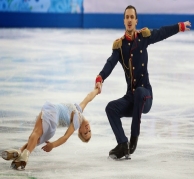
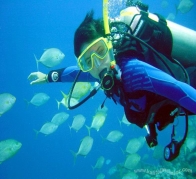
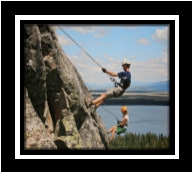
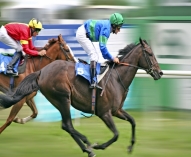
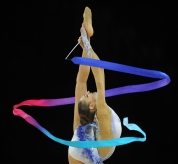
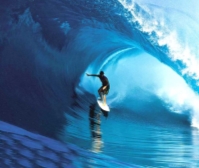


про публікацію авторської розробки
Додати розробку
